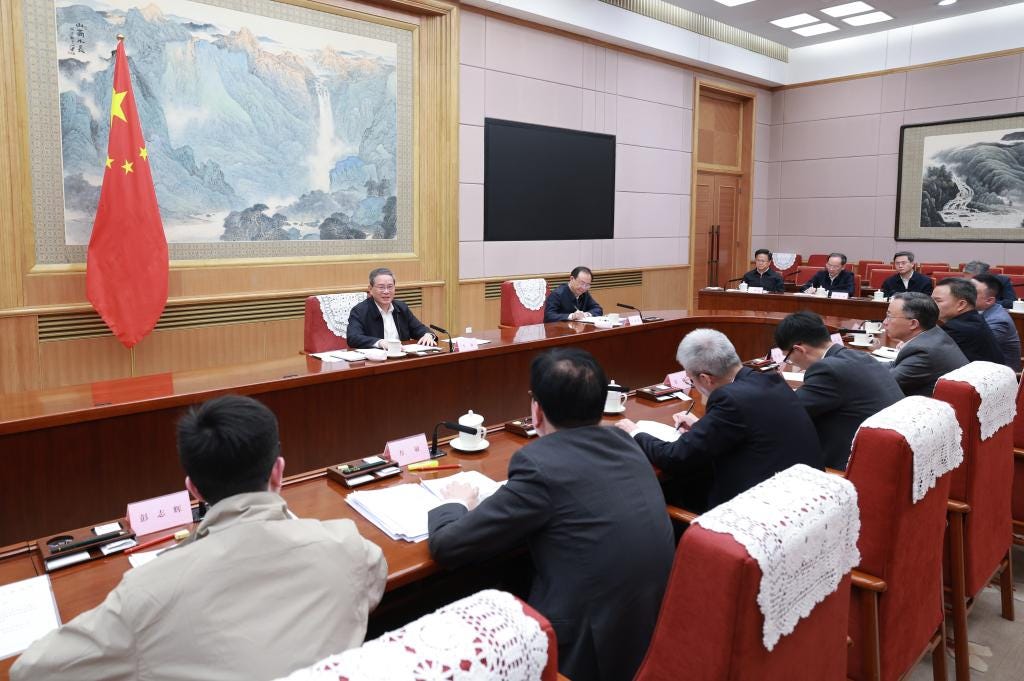125% vs 125%, what's next for China's economic policy?
Advice from leading economists invited by the Chinese Premier to a symposium
China today upped tariffs on U.S. goods to 125%, adding that:
鉴于在目前关税水平下,美国输华商品已无市场接受可能性,如果美方后续对中国输美商品继续加征关税,中方将不予理会。
Given that U.S. goods exported to China are no longer marketable under the current tariff rates, China will disregard any further U.S. tariff increases on Chinese goods.
So, what's next for China's domestic economic policy?
Undoubtedly, these significant tariff hikes will exert economic pressure on China, a traditionally export-driven economy. In response, China is pivoting towards investment and domestic consumption to unlock new growth opportunities.
Chinese e-commerce giant JD.com just announced a new initiative today, pledging to purchase at least 200 billion yuan worth of export-oriented goods for domestic sale over the next year, aimed at helping exporters rapidly access the domestic market.
You may find more clues from a symposium chaired by Premier Li Qiang on April 9th with leading economists and business leaders. The official readout was handed out via Xinhua.
Three economists were invited to this symposium: Zhang Bin 张斌, Senior Fellow at Institute of World Economics and Politics, Chinese Academy of Social Sciences; Li Xunlei 李迅雷, Chief Economist at Zhongtai Financial International Ltd; Shen Jianguang 沈建光, Vice President and Chief Economist of JD.com.
While specific details from their symposium speeches remain undisclosed, their recent publications may hint the direction of China's forthcoming economic policies. Excerpts from their writings provide further insight below.
Please note that all the words in bold are added by me.
Zhang Bin: Public investment crucial to addressing weak demand
At the Monthly Macroeconomic Data Analysis Meeting of China Macroeconomy Forum, Zhang Bin underscored the significance of public investment, noting that without strong support from public investment, it would be challenging for China to effectively overcome insufficient demand.
He highlighted three reasons:
First, historical data indicates a strong positive correlation between consumption and investment—higher investment stimulates spending, creating additional income, which in turn supports greater consumption.
Second, investment can swiftly respond to policy changes ("fast variable"), whereas consumption changes slowly as it's determined by long-term income trends involving millions of households ("slow variable"). Public investment decisions, primarily controlled by government entities, can rapidly adjust, providing immediate economic stimulus.
Third, relying solely on consumption to close the demand gap is unrealistic. Analysis suggests China's GDP currently faces a demand shortfall of 5-6 trillion yuan to return inflation to a moderate 2%. To fill this gap through consumption alone would require an unfeasible growth rate above 15%. Therefore, a combined strategy of "consumption plus investment," particularly driven by robust public investment, is critical for a sustained recovery in demand.
He further outlined significant room for growth in China's public investment:
Public service investment in China is significantly lower compared to developed countries. For instance, countries like the U.S., Germany, South Korea, France, and the UK typically allocate over 17% of their total investments to public services, while China allocates less than 5%. The same disparity exists in private service investments.
Clearly, there's a substantial gap we can fill in improving people's livelihoods. A pressing issue is the lack of adequate housing and public facilities for migrant workers in big cities. If we aim to enhance living standards and move our economy to the next level, we need more than basic material improvements—we must also invest more in culture, sports, and community services. This is precisely where public investment can play a critical role.
Based on my calculations, even if China doesn't aim to match the investment levels of developed countries entirely, just narrowing the gap would still require at least 30 trillion yuan in public investment dedicated to improving people's lives.
Finally, he discussed the sustainability of government debt:
From a fiscal sustainability perspective, increasing government borrowing under current economic conditions does not pose significant debt risks; instead, it enhances fiscal stability. When the government boosts investment, it directly stimulates economic growth, increases tax revenues, and raises income from land sales, while also supporting asset prices. As the economy recovers, government revenues will naturally rise, thus strengthening the capacity to service debt.
Li Xunlei: Ensuring reasonable income growth for low- and middle-income groups
In a March 22 post titled "Boosting consumption in 2025: Retail sales growth should no longer lag behind GDP," published on his WeChat public account, Li Xunlei noted:
In 2024, China's retail sales growth rate was only 3.5%. Although this figure improved slightly to 4% in January and February this year, given the expected slowdown in export growth, the growth rate of retail sales should surpass 5% in 2025. To this end, the government needs to allocate a higher proportion of fiscal spending towards promoting consumption.
2024 Central Economic Work Conference had recognized pressures on employment and income growth, largely due to weak consumer demand and subdued prices, which have dampened business performance and employers' willingness to hire or raise wages. In this context, achieving reasonable wage growth for workers—especially those with middle and lower incomes—and ensuring timely and sufficient unemployment benefits are critical factors for the effectiveness of policies aimed at boosting consumption.
Regarding specific measures, Li proposed two key approaches:
First, optimizing the wage system for state-owned enterprises (SOEs) to strengthen their role in employment stabilization. To better leverage their social responsibilities, he recommended adjustments such as incorporating a proportion of surplus profits into the wage pool and excluding the salary costs associated with hiring fresh college graduates from annual wage totals.
Second, simplifying the procedures for claiming unemployment benefits. Streamlining unemployment verification processes and moderately raising benefit amounts would provide stronger support to unemployed individuals.
Shen Jianguang: Market access restrictions on private enterprises deserve attention
In a recent post titled "Three major lessons brought by DeepSeek's success" on his WeChat public account, Shen Jianguang, who has long followed China's consumer market development and technological innovation, discussed how DeepSeek's success demonstrates the creativity and resilience of China's private sector.
DeepSeek's breakthrough, despite external chip embargoes and internal resource constraints—including regulatory pressures on quantitative hedge funds—shows the flexibility and operational efficiency of private enterprises. Similar cases can be seen in sectors like electric vehicles and photovoltaic batteries, where private Chinese companies have overcome significant barriers and gained global recognition for their competitive capabilities. Likewise, in the global competition around large AI models, Chinese internet platform companies leverage their capital strengths and accumulated data to attract talent and compete effectively against international tech giants.
Yet, private enterprises still face unfair treatment in several areas, including market access restrictions, regulatory constraints on tech company IPOs, and even "offshore fishing" into entrepreneurs. Addressing these issues presents a critical opportunity for further improvement.






I disagree with the following:
First, optimizing the wage system for state-owned enterprises (SOEs) to strengthen their role in employment stabilization.”
SOEs are not China’s future. China’s economic growth and innovation must come from China’s entrepreneurs.
Copy the U.S. program “Junior Achievement” but revise it into a program for any prospective entrepreneurs
Give China’s people a structured way to create new companies.